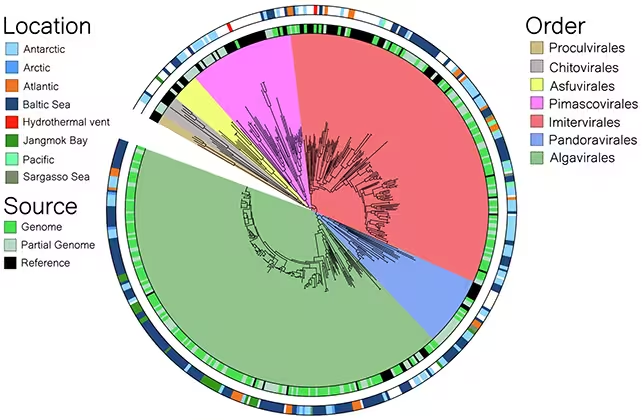4 Minutes
Revealing a Hidden World: The Discovery of Giant Viruses in the Oceans
In a significant advancement for marine microbiology and virology, researchers have identified hundreds of previously unknown giant viruses lurking throughout the world's oceans. Led by Benjamin Minch, a marine biologist, and Mohammad Moniruzzaman, a virologist—both of the University of Miami—the international team employed advanced computational tools to analyze genetic material from seawater samples collected across the globe. This comprehensive study resulted in the identification of 230 new giant viruses, broadening our understanding of oceanic biodiversity and the underlying mechanisms that shape marine ecosystems.
Scientific Context: Understanding the Marine Virosphere
Viruses are the most abundant biological entities in marine environments, with each drop of seawater containing millions. While viruses targeting bacteria (bacteriophages) have been studied extensively, the discovery of giant viruses—viruses with exceptionally large genomes and complex structures—has only begun to reshape scientific perspectives in recent decades. These newly uncovered giant viruses primarily infect protists, a diverse group of single-celled organisms that include algae, amoebae, and flagellates. Understanding these viral-host relationships is vital, as protists are foundational to ocean food webs and oxygen production.

Key Discoveries and Implications for Marine Ecology
The detection of these giant viruses was achieved using cutting-edge genome sequencing technologies and custom-designed software, which sifted through massive genetic datasets to distinguish viral sequences from other microbial DNA. In addition to cataloging 230 previously unknown giant viruses, the research team discovered 569 new functional proteins. Among these, nine proteins are directly associated with photosynthesis—a process that viruses can manipulate to extract energy from their hosts.
"We found that giant viruses carry genes related to essential cellular functions like carbon metabolism and photosynthesis, functions once thought to be exclusive to cellular organisms," says Minch. This finding suggests that giant viruses may play a disproportionate role in rewiring host metabolism during infection, potentially influencing nutrient cycles and biogeochemical processes throughout the marine environment.
Moniruzzaman adds, "Improving our knowledge of giant viral diversity and their interactions with marine algae can help us forecast and even mitigate harmful algal blooms, which pose health risks both in Florida and worldwide."
Significantly, the team classified these giant viruses into two major orders: Imitervirales and Algavirales. Imitervirales appear to possess more complex genetic makeup and flexible life strategies, enabling them to infect a broader range of hosts—a discovery that offers new variables for ecological forecasting and disease prevention.

Technological Advances and Future Prospects
The exponential growth of genome databases, coupled with more precise analysis software, has streamlined the process of discovering and classifying new viruses. These tools not only enhance our understanding of marine microbial diversity but also pave the way for monitoring environmental health and identifying waterborne pathogens or pollutants.
"Our research created a foundational framework improving existing methods to detect novel viruses. This is essential for monitoring pollution and emerging pathogens in aquatic environments," Minch notes, underscoring the broader potential of their techniques.
Moreover, this investigation highlights that we have only begun to explore the immense viral diversity inhabiting our oceans. With millions of viruses left to identify, continued research promises deeper insights into marine ecosystems, their resilience, and their impacts on global processes such as climate regulation and oxygen production.
Conclusion
The unprecedented discovery of hundreds of giant viruses in Earth’s oceans not only expands our knowledge of marine biodiversity but also redefines our understanding of virus-host dynamics, ocean health, and planetary biogeochemistry. As technology continues to advance, scientists will be better equipped to explore this vast virosphere, offering new hope for managing ecological threats and safeguarding the crucial systems that sustain life on our planet.
Source: sciencealert



Comments